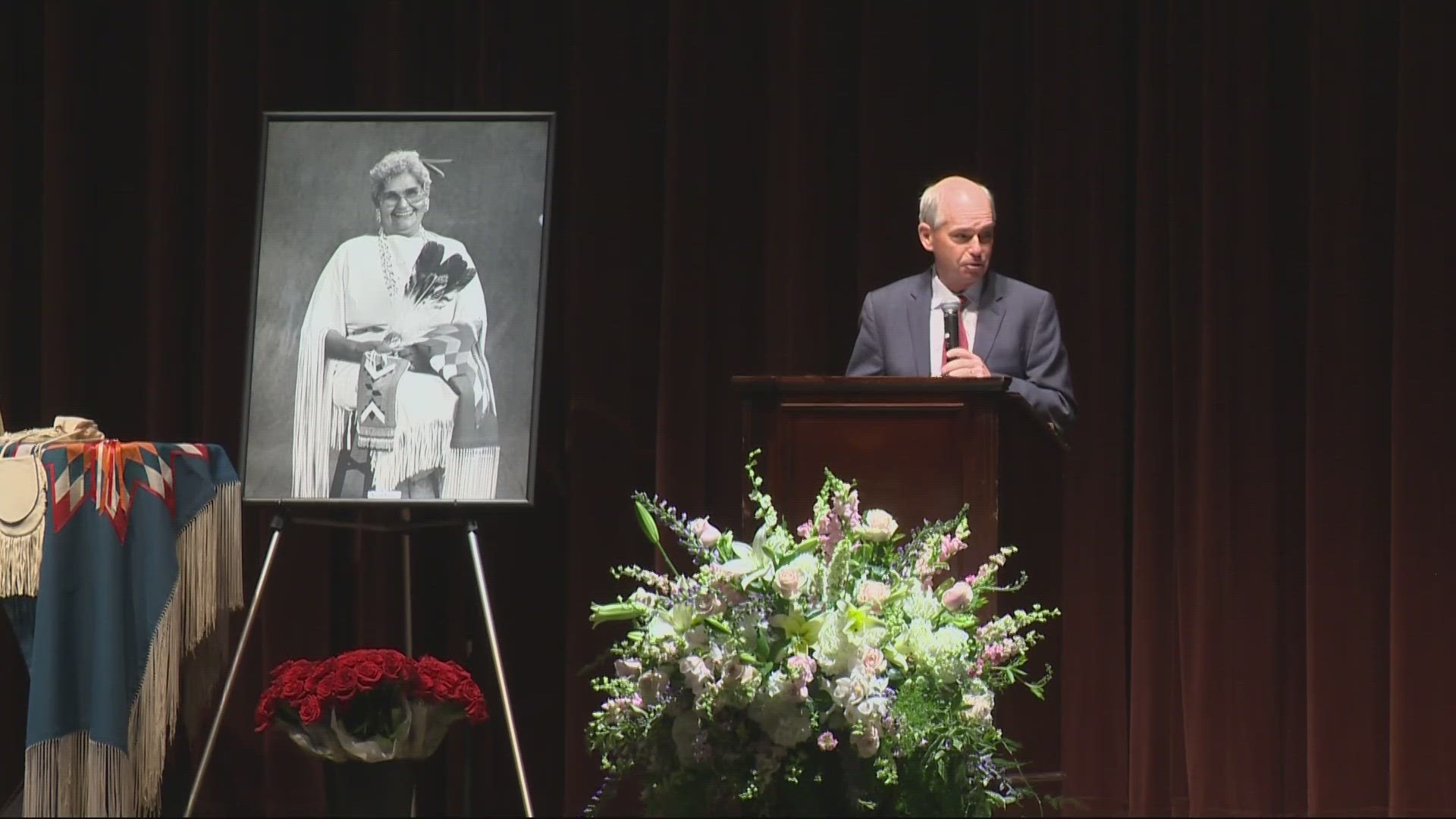GRAND RONDE, Ore. — Kathryn Harrison of the Confederated Tribes of Grand Ronde was one of Oregon's most influential tribal leaders. She died on May 21 at the age of 99, and she was remembered at a service on Sunday.
She didn't live an easy childhood. Harrison was orphaned at the age of 10 after her parents passed away from the flu. She was sent to a foster home where she was abuse.
As an adult, she raised 10 children of her own with little to no help from her husband, who dealt with alcoholism.
At the age of 47, she enrolled in classes at Lane Community College and became a nurse.
"She would always say, 'If you don't have health, you don't have anything.' Money doesn't mean a lot, how much you own, what you know, your degrees. None of that. If you don't have health, you don't have anything," Cheryle Ann Kennedy, tribal chair for the Confederated Tribes of Grand Ronde, said at the service.
The sounds of drums and songs filled the room at the Spirit Mountain Casino. Voices carried the tune of Harrison's life.
Her niece, Kat Brigham, spoke about how caring she was.
"That's the way she always was, she cared more about people than herself. She outreached people to say how are you doing and she loved to hug people, and she was supportive in many, many ways," Bringham said.
Kennedy spoke of her legacy.
"When we look at where the tribe was and where we are today, we owe a debt of gratitude," Kennedy said.
Politicians from Congressman Earl Blumenauer, to former Oregon governors Barbara Roberts and Kate Brown also spoke of their relationship with Harrison.
"Kathryn Harrison was a woman that was known and respected statewide," Roberts said. "She was wise. She served others. She respected history and the past, yet she saw the future and planned for it."
Almost everyone at the service was in some way touched by her life.
Kerry Tymchuk, executive director of the Oregon Historical Society, said Harrison was a friend of his for more than two decades. He said Harrison was someone that didn't let her short height ever get in the way of what she wanted.
"Persistence, she just didn't give up. There were many times, many opportunities where she could've given up where there were too many hurdles in the road," Tymchuk told KGW before the service.
She was known for her efforts to restore Native American Tribal status, working for years to overturn the Termination Act of 1954, which took federal recognition from 61 tribes in Oregon.
"If it weren't for her, we Siletz had a difficult time being restored," said Delores Pigsley, tribal chair for the Confederated Tribes of Siletz Indians. "We owe her family for lending us Kathryn for all these years."
Harrison testified in front of Congress and helped to restore not only the Siletz Tribe's status, but also get federal recognition back for the Confederated Tribes of the Grand Ronde.
"Restoration was really a vision of the heart," Kennedy said, "I believe sent by our creator, help our people come into what he planned for us. She was one of those leaders."
Her years of determination paid off in the fall of 1983, when Harrison got a call from Oregon Representative Les AuCoin saying the bill she was championing had passed.
Harrison didn't stop there. She worked with AuCoin and Oregon Sen. Mark Hatfield on the Reservation Restoration Act of 1988. She also helped establish the Spirit Mountain Casino in the late 1990s and the Spirit Mountain Community Fund, which has donated millions of dollars to nonprofits across the region.
"I think her most accomplishment as chief we're standing in, Spirit Mountain. What this has done for the economy, for the future of tribal members is life changing," Tymchuk said.

